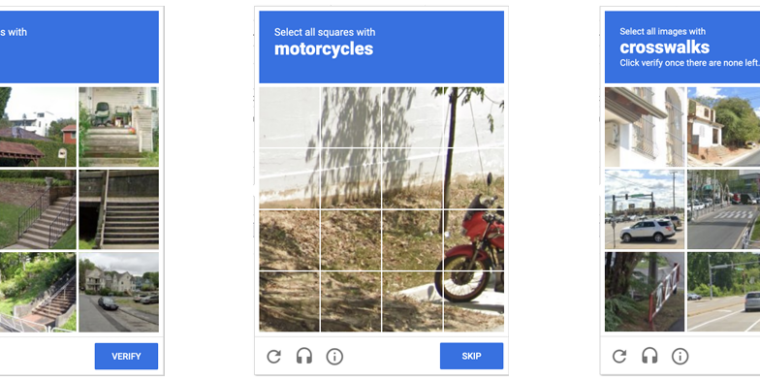- cross-posted to:
- technology@lemmy.world
- cross-posted to:
- technology@lemmy.world
Anyone who has been surfing the web for a while is probably used to clicking through a CAPTCHA grid of street images, identifying everyday objects to prove that they’re a human and not an automated bot. Now, though, new research claims that locally run bots using specially trained image-recognition models can match human-level performance in this style of CAPTCHA, achieving a 100 percent success rate despite being decidedly not human.
ETH Zurich PhD student Andreas Plesner and his colleagues’ new research, available as a pre-print paper, focuses on Google’s ReCAPTCHA v2, which challenges users to identify which street images in a grid contain items like bicycles, crosswalks, mountains, stairs, or traffic lights. Google began phasing that system out years ago in favor of an “invisible” reCAPTCHA v3 that analyzes user interactions rather than offering an explicit challenge.
Despite this, the older reCAPTCHA v2 is still used by millions of websites. And even sites that use the updated reCAPTCHA v3 will sometimes use reCAPTCHA v2 as a fallback when the updated system gives a user a low “human” confidence rating.



They are also overly US centric.
One of the questions asks you to click on only the school buses. I had to Google how you tell the difference between a school bus and not a school bus.
Also is it a crosswalk if it’s at an intersection or is it only a crosswalk if it’s in the middle of a road somewhere?
The questions either need to be not cultural or they need to be adapted for where they detect the user is coming from, the first option seems easier.
Interesting. Do you not have school buses, or are school buses not distinctly marked? How do kids get to school when it’s beyond walking distance?
You know, regular buses
And, you know, school busses.
Now imagine if they looked this same loo
They are just buses.
I guess the British government just assume that school children are smart enough to get on the right bus without them being individually distinct.
I knew school buses are yellow but I did not realize that they are always yellow. I did not realize that the yellow color meant school. I just assumed that the yellow color was a color busses could be.
The size of the UK verses the exponentially larger size of the US probably has a lot to do with it.
And if you knew school busses where yellow… Where’s the problem?
School busses and regular busses look completely different. What do those look like in your country?
Same as any bus
So if you see a picture that obviously a regular bus, alongside a different bus, what would you infer from that when asked which bus is not the same as “any bus”?
How would you know what is a regular bus and what is not a regular bus for a given country?
Well here in, not the United States of America land, we just have busses. I was not aware that busses required a special magic paint job.
I suppose the paint job prevents school shooters wasting their time.